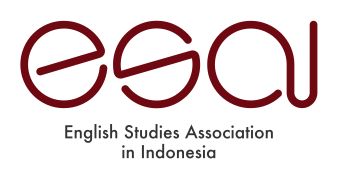An Analysis on Verb Collocation of 'Excited': Corpus-Based Research
Abstract
In learning English, one main problem that learners often encounter is learning vocabulary. Learners cannot use English to communicate if they do not have enough words or vocabulary to convey what they want to say. That is why, learning vocabulary is important. However, it is not always easy to learn vocabulary. Learning vocabulary can be troublesome. One type of vocabulary which is confusing for learners to learn is adjectives, especially verbal adjectives. Verbal adjectives are adjectives which are derived from verbs. These adjectives usually have –ed and –ing ending. Some examples are ‘bored’, ‘boring’, ‘confused’, ‘confusing’, ‘excited’, ‘exciting’, etc. These adjectives are often confusing for learners of English. Based on this problem, the writer decided to conduct research about this adjective. However, the writer only wants to analize and discuss the adjectives that end with –ed. The specific word that is going to be analized is ‘excited’. Since this research is corpus based research, the research will focus on the verbs that collocate with the adjective ‘excited’. The writer will see how many verbs that frequently collocate with ‘excited’. After that, the writer will see the differences between those verbs. Finally, the writer will compare the results of the COCA and the results of the students’ test. In learning English, one main problem that learners often encounter is learning vocabulary. Learners cannot use English to communicate if they do not have enough words or vocabulary to convey what they want to say. That is why, learning vocabulary is important. However, it is not always easy to learn vocabulary. Learning vocabulary can be troublesome. One type of vocabulary which is confusing for learners to learn is adjectives, especially verbal adjectives. Verbal adjectives are adjectives which are derived from verbs. These adjectives usually have –ed and –ing ending. Some examples are ‘bored’, ‘boring’, ‘confused’, ‘confusing’, ‘excited’, ‘exciting’, etc. These adjectives are often confusing for learners of English. Based on this problem, the writer decided to conduct research about this adjective. However, the writer only wants to analyze and discuss the adjectives that end with –ed. The specific word that is going to be analized is ‘excited’. Since this research is corpus based research, the research will focus on the verbs that collocate with the adjective ‘excited’. The writer will see how many verbs that frequently collocate with ‘excited’. After that, the writer will see the differences between those verbs. Finally, the writer will compare the results of the COCA and the results of the students’ test.
Keywords: corpus, verb collocation, excited
Full Text:
PDFReferences
Benson, M., Benson, E., & Ilson, R. (1997). The BBI dictionary of English word combinations. BBI Combinatory Dictionary of English. Amsterdam: Benjamin.
Corpus. (2017). In Merriam-Webster’s online dictionary. Retrieved from https://www.merriam-webster.com/dictionary/corpus
Krishnamurthy, R. (2014). Accessing all areas: Corpus analysis methods in interdiciplinary applications. Birmingham: Aston University.
Larson, M. L. (1984). Meaning-based translation: A guide to cross-language equivalence. Lanham: University Press of America.
Newmark, P. (1981). Approaches to translation. Oxford: Pergamon Press.
Newmark, P. (1988). A textbook of translation. London: Prentice Hall.
Sinclair, J. (1991). Corpus, concordance, collocation. Oxford: Oxford University Press.
Text corpus. (n.d.). Retrieved from https://en.wikipedia.org/wiki/Text_corpus
What is a corpus. (2017). In Oxford dictionaries. Retrieved from https://en.oxforddictionaries.com/expexpl/what-is-a-corpus
What is corpus. (n.d.). Retrieved from http://language.worldofcomputing.net/linguistics/introduction/what-is-corpus.html
DOI: http://dx.doi.org/10.30813/jelc.v7i2.1027
Refbacks
- There are currently no refbacks.



2.jpg)



